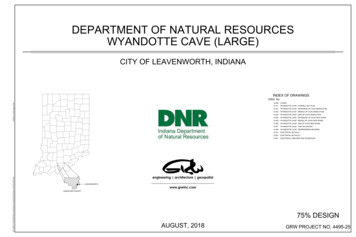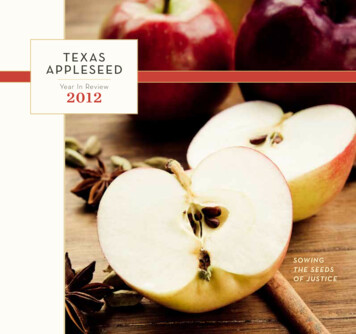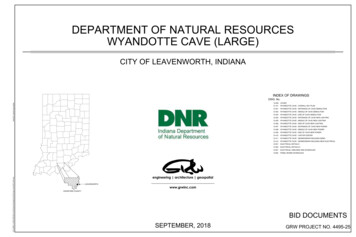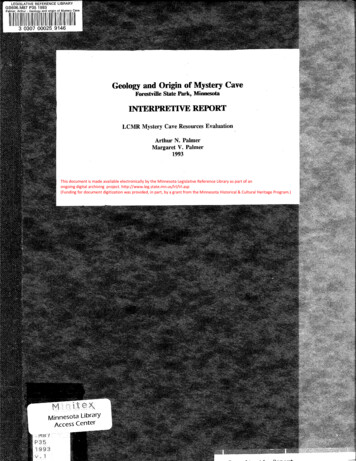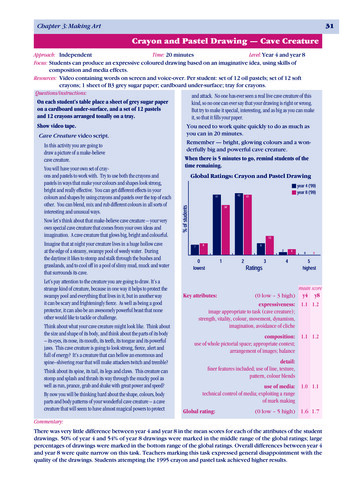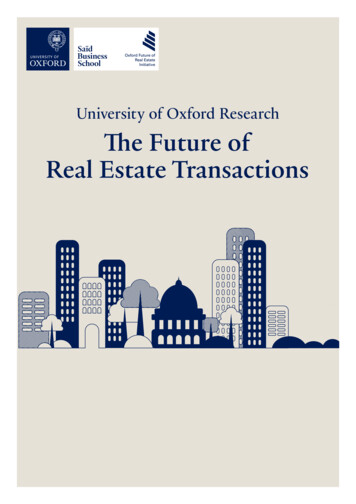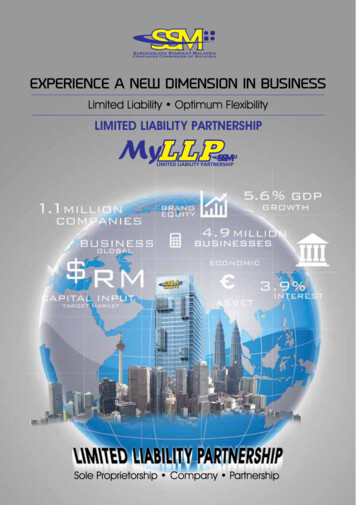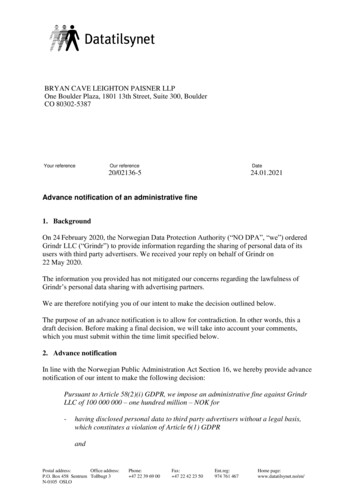
Transcription
BRYAN CAVE LEIGHTON PAISNER LLPOne Boulder Plaza, 1801 13th Street, Suite 300, BoulderCO 80302-5387Your referenceOur referenceDate20/02136-524.01.2021Advance notification of an administrative fine1. BackgroundOn 24 February 2020, the Norwegian Data Protection Authority (“NO DPA”, “we”) orderedGrindr LLC (“Grindr”) to provide information regarding the sharing of personal data of itsusers with third party advertisers. We received your reply on behalf of Grindr on22 May 2020.The information you provided has not mitigated our concerns regarding the lawfulness ofGrindr’s personal data sharing with advertising partners.We are therefore notifying you of our intent to make the decision outlined below.The purpose of an advance notification is to allow for contradiction. In other words, this adraft decision. Before making a final decision, we will take into account your comments,which you must submit within the time limit specified below.2. Advance notificationIn line with the Norwegian Public Administration Act Section 16, we hereby provide advancenotification of our intent to make the following decision:Pursuant to Article 58(2)(i) GDPR, we impose an administrative fine against GrindrLLC of 100 000 000 – one hundred million – NOK for-having disclosed personal data to third party advertisers without a legal basis,which constitutes a violation of Article 6(1) GDPRandPostal address:Office address:P.O. Box 458 Sentrum Tollbugt 3N-0105 OSLOPhone: 47 22 39 69 00Fax: 47 22 42 23 50Ent.reg:974 761 467Home page:www.datatilsynet.no/en/
-having disclosed special category personal data to third party advertisers withouta valid exemption from the prohibition in Article 9(1) GDPRAlthough we have chosen to focus our investigation on the legitimacy of the previousconsents in the Grindr application (“app”), there might be additional issues regarding e.g. dataminimization in the previous and/or in the current consent mechanism platform. We havelimited our investigation to the scope of the complaints. As described below, the complaintsaddressed concerns regarding the previous consents in the app. The fact that some issues havefallen outside the scope of our investigation does not preclude those issues from beingaddressed in the future. Grindr must make sure that all processing of personal data on its usersin the EEA is compliant with the GDPR at all times. We may decide to investigate additionalissues later on, following individual complaints or ex officio, see the tasks and powers of thesupervisory authorities laid down in Articles 57 and 58 GDPR.The NO DPA is the supervisory authority established in line with Article 51(1) GDPR tomonitor the application of the GDPR on the territory of the Kingdom of Norway. This followsfrom the Norwegian Personal Data Act Section 20.3. Facts and background of the caseAccording to Grindr, the Grindr app is a GPS based social networking app designed to permitusers to share information about themselves with other users in order to facilitate userinteractions and connections. Grindr markets itself as the world’s largest social networkingapp for gay, bi, trans and queer people.In January 2020, the we received three complaints from The Norwegian Consumer Council(“the NCC”) in collaboration with noyb — European Center for Digital Rights, on behalf of acomplainant.According to the complaints, Grindr lacked a legal basis for sharing personal data on its userswith third party companies when providing advertising in its free version of the Grindrapplication (“app”). The NCC stated that Grindr shared such data through softwaredevelopment kits (“SDKs”).The complaints addressed concerns on the data sharing between Grindr and the followingadvertising partners (collectively referred to as “advertising partners” or “third partyadvertising partners”): Twitter Inc. (“Twitter’s MoPub”)Xandr Inc. (“Xandr”, previously AppNexus Inc.)OpenX Software Ltd. (“OpenX”)AdColony Inc. (“AdColony”)Smaato Inc. (“Smaato”)According to its privacy policy, Grindr shares the following data with third party advertisingcompanies:2
[ ] your hashed Device ID, your device’s advertising identifier, a portion of yourProfile Information, Location Information, and some of your demographicinformation with our advertising partners1In the same document, Grindr states that it shares the following personal data with itsadvertising partners:Hardware and Software Information; Profile Information (excluding HIV Status andLast Tested Date and Tribe); Location and Distance Information; Cookies; Log Filesand Other Tracking Technologies.Additional Personal Data we receive about you, including: Third-Party TrackingTechnologies.In its report,2 the NCC refers to the Grindr privacy policy which only names one suchadvertising partner, namely Twitter’s MoPub. Twitter’s MoPub lists 160 partners.The NCC have concerns over Grindr’s statement that it does “not control the use of thesetracking technologies” while asking users to read the privacy policies of any third parties thatmay receive personal data. The NCC claims it is not clear how the user would be able to readthe privacy policy of any other advertising partners, and that Grindr does not take adequateresponsibility as a controller of any personal data collected and shared through its services.According to the NCC, Grindr’s processing does not meet the transparency requirement in theGDPR.Grindr claims its consents were valid pursuant to the GDPR, and that its efforts to obtainconsents exceeded industry standards already in 2017 and later on in 2018.Grindr further argues controllers should not be held to the latest standard immediately uponthe new standard’s promulgation by legislators.Grindr implemented a new Consent Management Platform (“CMP”) 8 April 2020. Grindrbegan exploring new possibilities in June 2019, and selected OneTrust LLC in December–January to develop the new platform.As mentioned, we have limited our investigations to the previous CMP. This consentmechanism used a two-layered approach. After first displaying the full privacy policy, the appasked the data subject if it wanted to “proceed”. Data subjects were then asked to “opt-in” toprocessing activities by clicking “accept”.Grindr argues it was one of, if not the only, popular app that provided the full privacy policywithin the app and that obtained specific, informed and unambiguous consents to its privacy12Found on grindr.com/privacy-policy, last accessed 7 February 2020.Out of control, How consumers are exploited by the online advertising industry, 14 January 2020, p. 74.3
practises in mid-2018. The industry standard at that time was to either (1) provide nodisclosure of privacy practises, or (2) bundle a request to consent with consent to terms of use.After surveying the top-rated free dating apps and “gay” dating apps identified in the GooglePlay Store, you found that Grindr was the only app that provided a full copy of the privacynotice prior to soliciting personal data. Although every app collected special categoryinformation, Grindr was the only surveyed app that asked for consent prior to the collection ofany information.Furthermore, Grindr maintains to be the only surveyed app that did not bundle consent toprivacy policies with consent to contractual terms.Finally, Grindr claims to be one of only a few of the surveyed apps that solicited affirmativeconsents from data subjects. While most apps indicated that processing was based on consent,they did not require data subjects to take any affirmative actions to demonstrate consent.4. Relevant GDPR requirements4.1. The principle of lawfulness, fairness and transparencyAccording to Article 5(1)(a), personal data must be processed “lawfully, fairly and in atransparent manner in relation to the data subject”.4.2. Consent pursuant to Article 6(1)(a)Pursuant to Article 6(1), processing shall be lawful only if and to the extent that at least one ofthe requirements in (a) to (f) applies.If the controller relies on Article 6(1)(a), consent is defined in Article 4(11) as[ ] any freely given, specific, informed and unambiguous indication of the datasubject’s wishes by which he or she, by a statement or by a clear affirmative action,signifies agreement to the processing of personal data relating to him or her.Accordingly, Article 4(11) stipulates four requirements for a valid consent. It must be “freelygiven”, “specific”, “informed” and “unambiguous”.Article 7 and recitals 32, 33, 42 and 43 also outline how the controller must act to complywith the main elements of the consent requirements.3In addition, The European Data Protection Board (“EDPB”) has provided guidance with ananalysis of the notion of consent in GDPR.43European Data Protection Board, Guidelines 05/2020 on consent, Version 1.1, adopted on 4 May 2020, para.9.4Ibid. para. 1.4
“Freely given”According to EDPB, the element “free” implies real choice and control for data subjects.5EDPB’s analysis shows that the criteria “freely given” contains four requirements: i)granularity, ii) data subject must be able to refuse or withdraw consent without detriment, iii)no conditionality, and iv) no imbalance of power.i)GranularityGDPR recital 32 highlights thatConsent should cover all processing activities carried out for the same purpose orpurposes. When the processing has multiple purposes, consent should be given for allof them.According to recital 43,Consent is presumed not to be freely given if it does not allow separate consent to begiven to different personal data processing operations despite it being appropriate inthe individual case, [ ]ii)Refusal or withdrawal of consent without detrimentAccording to recital 42,Consent should not be regarded as freely given if the data subject has no genuine orfree choice or is unable to refuse or withdraw consent without detriment.EDPB states the following in its guidelines:For example, the controller needs to prove that withdrawing consent does not lead toany costs for the data subject and thus no clear disadvantage for those withdrawingconsent.6EDPB further affirms thatIf a controller is able to show that a service includes the possibility to withdrawconsent without any negative consequences e.g. without the performance of the servicebeing downgraded to the detriment of the user, this may serve to show that the consentwas given freely. The GDPR does not preclude all incentives but the onus would be on56Ibid. para. 13.Ibid. para. 46.5
the controller to demonstrate that consent was still freely given in all thecircumstances.7iii)ConditionalityRecital 43 states thatConsent is presumed not to be freely given [ ] if the performance of a contract,including the provision of a service, is dependent on the consent despite such consentnot being necessary for such performance.Article 7(4) GDPR constitutes thatWhen assessing whether consent is freely given, utmost account shall be taken ofwhether, inter alia, the performance of a contract, including the provision of a service,is conditional on consent to the processing of personal data that is not necessary forthe performance of that contract.Article 7(4) seeks to ensure that the purpose of personal data processing is not disguised norbundled with the provision of a contract of a service for which these personal data are notnecessary.8 The term “necessary for the performance of a contract” needs to be interpretedstrictly.9 The processing must be necessary to fulfil the contract with each individual datasubject.10Compulsion to agree with the use of personal data additional to what is strictly necessarylimits data subject’s choices and stands in the way of free consent.11iv)Imbalance of powerRecital 43 highlights that consent should not provide a valid legal basis for processing in aspecific case where there is a clear imbalance between the data subject and the controller.In this regard, EDPB states:As highlighted by the WP29 in several Opinions, consent can only be valid if the datasubject is able to exercise a real choice, and there is no risk of deception, intimidation,coercion or significant negative consequences (e.g. substantial extra costs) if he/she7Ibid. para. 48.Ibid. para. 26.9Article 29 Working Party, Opinion 06/2014 and European Data Protection Board, Guidelines 2/2019 on theprocessing of personal data under Article 6(1)(b) GDPR in the context of the provision of online services to datasubjects, Version 2.0, 8 October 2019, Section 2.4.10European Data Protection Board, Guidelines 05/2020 on consent, Version 1.1, adopted on 4 May 2020, para.30.11Ibid. para 27.86
does not consent. Consent will not be free in cases where there is any element ofcompulsion, pressure or inability to exercise free will.12“Specific”Article 6(1)(a) confirms that consent from a data subject must be given in relation to “one ormore specific purposes” and that a data subject has a choice in relation to each of them. Therequirement aims to ensure a degree of user control and transparency.13According to guidance provided by EDPB, to comply with the element of “specific” thecontroller must apply:i)ii)iii)Purpose specification as a safeguard against function creep,Granularity in consent requests, andClear separation of information related to obtaining consent for data processingactivities from information about other matters.14“Informed”According to guidelines provided by EDPB, the requirement for consents to be “informed” isreinforced through the GDPR and aims to provide user control. EDPB further statesBased on Article 5 of the GDPR, the requirement for transparency is one of thefundamental principles, closely related to the principles of fairness and lawfulness.Providing information to data subjects prior to obtaining their consent is essential inorder to enable them to make informed decisions, understand what they are agreeingto, and for example exercise their right to withdraw their consent. If the controllerdoes not provide accessible information, user control becomes illusory and consentwill be an invalid basis for processing.15The guidelines further state:Controllers cannot use long privacy policies that are difficult to understand orstatements full of legal jargon. Consent must be clear and distinguishable from othermatters and provided in an intelligible and easily accessible form.16Article 7(2) GDPR also asserts how the controller should provide the information:If the data subject’s consent is given in the context of a written declaration which alsoconcerns other matters, the request for consent shall be presented in a manner whichis clearly distinguishable from the other matters, in an intelligible and easilyaccessible form, using clear and plain language. Any part of such a declaration whichconstitutes an infringement of this Regulation shall not be binding.12Ibid. para. 24.Ibid. para. 55.14See para. 55.15Ibid. para. 62.16Ibid. para. 67.137
If the data subject’s consent is to be given following a request by electronic means, therequest must be clear, concise and not unnecessarily disruptive to the use of the service forwhich it is provided.17“Unambiguous”EDPB sets out guidance on the “unambiguous” criterion. For example, it must be obvious thatthe data subject has consented to the particular processing.18EDPB further states:A controller must also beware that consent cannot be obtained through the same motionas agreeing to a contract or accepting general terms and conditions of a service. Blanketacceptance of general terms and conditions cannot be seen as a clear affirmative action toconsent to the use of personal data.194.3. Processing special categories of personal data under Article 9Processing of special categories of personal data needs additional legal basis in Article 9GDPR.Article 9 applies topersonal data revealing racial or ethnic origin, political opinions, religious orphilosophical beliefs, or trade union membership, and the processing of genetic data,biometric data for the purpose of uniquely identifying a natural person, dataconcerning health or data concerning a natural person’s sex life or sexualorientation[ ].Article 9(1) prohibits controllers from processing such data, unless the controller candemonstrate that the processing falls within one of the exemptions in Article 9(2). One of theexemptions applies if the data subject has given “explicit consent to the processing of thosepersonal data for one or more specified purposes,” pursuant to Article 9(2)(a).5. Our assessment of the case5.1. Whether Grindr’s previous consent mechanism was compliant with Article 6Grindr states its legal basis for sharing personal data to third party advertisers is consentpursuant to Article 6(1)(a).17GDPR recital 32.Ibid. para. 75.19Ibid. para. 81.188
We agree that consent is the appropriate legal basis for assessment in this case. In itsguidelines on Article 6(1)(b) in the context of digital services, the EDPB clarified that onlinebehavioural advertising is generally not necessary for the performance of a contract with adata subject.20 Furthermore, in the Article 29 Working Party profiling guidelines,21 whichhave been endorsed by the EDPB, the Working Party Stated that[ ] it would be difficult for controllers to justify using legitimate interests as a lawfulbasis for intrusive profiling and tracking practices for marketing or advertisingpurposes, for example those that involve tracking individuals across multiple websites,locations, devices, services or data-brokering.As a rule, any extensive disclosure to third parties of personal data for marketing purposesshould be based on the data subject’s consent, as the other legal bases in Article 6(1) wouldnot seem fit or adequate.The Norwegian DPA shall assess whether the consents that Grindr collected for the disclosureof personal data to third party advertising partners in its previous CMP were compliant withArticle 6(1)(a). We have not assessed Grindr’s current CMP at this point, as this is beyond thescope of the complaint.As mentioned, consents must meet several criteria according to the provisions explainedabove. In the following, we will assess the previous consents against these requirements.5.1.1. Freely givenAccording to Article 4(11), consent must be “freely given”. As mentioned, the GDPR recitalsand guidance provided by EDPB give several clarifications as to when a consent is “freelygiven”.GranularityRecital 43 states that a consent is presumably not given freely if it does not allow separateconsents to be given to different personal data processing operations.As Grindr argues, their previous consent mechanism displayed the full privacy policy, askingthe data subject to “Proceed”. When the data subject proceeded, Grindr asked if the datasubject wanted to “Cancel” or “Accept” the processing activities.Accordingly, Grindr’s previous consents to sharing personal data with its advertising partnerswere bundled with acceptance of the privacy policy as a whole. The privacy policy containedall of the different processing operations, including processing necessary for providingservices and products associated with a Grindr account.20European Data Protection Board, Guidelines 2/2019 on the processing of personal data under Article 6(1)(b)GDPR in the context of the provision of online services to data subjects, 8 October 2019, pp. 14–15.21Article 29 Working Party, Guidelines on Automated individual decision-making and Profilingfor the purposes of Regulation 2016/679, 6 February 2018, pp. 14–15.9
Sharing personal data with advertising partners is a different processing operation than e.g.processing that is necessary for providing the main services in the app. The processingoperations also serve different purposes.Grindr’s consent requests were bundled with other processing operations and other purposes.The consent requirements aim to give data subjects control and equip them to make informeddecisions. When bundling a consent to necessary processing with consent to sharing personaldata with advertising partners, Grindr deprives data subjects of real control over their personaldata.Grindr has argued that it did not bundle consent with agreeing to terms of use.In our view, the way Grindr bundled consent with the whole privacy policy does not differsignificantly from bundling consent with terms of use. In both cases, the data subject ispresented with a lot of information at once. The lack of granularity in this regard can “nudge”the data subjects to proceed without familiarizing themselves with the provided information,which also deprives them of real control.For these reasons, we can establish that Grindr’s previous consent mechanism did not allowfor separate consents to be given to different purposes or processing operations. Therefore,Grindr’s previous consents to sharing personal data with advertising partners were not given“freely”.ConditionalityThe performance of a contract, including the provision of a service, cannot be dependent onconsent to processing personal data if such processing is not strictly necessary for theperformance of that contract.As mentioned above, processing personal data for online behavioral marketing purposescannot generally be considered necessary for the performance of the service.The previous consent mechanism in the Grindr app displayed the full privacy policy, askingthe user to “Accept” or “Cancel”. It is our understanding that Grindr users who chose not toaccept to behavioural advertising, would press “Cancel”. By pressing “Cancel”, the Grindruser would be excluded from the free version of the app, but could upgrade to the paidversion.Consequently, gaining access to the Grindr services within the free version of the app seemeddependent on consenting to sharing personal data for marketing purposes. This implies breachof the element of conditionality.Grindr states that it provided data subjects with information on how it could “opt-out” onsharing data with advertising partners from its own device.10
However, “opting-out” is not equivalent to a consent pursuant to GDPR. An “opt-out”solution would not meet the requirements for a valid consent. We discuss this further underthe unambiguous section below.In addition, the NCC stated “opting-out” through an Android device showed limited impacton data flow.Grindr argues that the technical report provided by the NCC is misleading. When “optingout” through an Android device, Grindr would either a) transmit a signal conveying the user’s“opt-out” preference, b) remove or obfuscate the user’s Advertising ID from its transmissions,or c) do both of the abovementioned.However, in our view, providing data subjects with information on how they could “opt-out”on their own device is not in line with the principle of accountability in Article 5(2) GDPR. Inthe cases of Smaato, OpenX and AdColony, Grindr “only” transmitted a signal conveying thedata subject’s “opt-out” preference. We understand that advertising partners could choose toignore that signal. In any case, Grindr would have to rely on the action of others, either theuser, the operating system, Grindr’s partners, or a combination of the aforementioned, to haltits sharing of data where so required. In consequence, Grindr failed to control and takeresponsibility for their own data sharing, and the “opt-out” mechanism is not necessarilyeffective.Furthermore, for a consent to be “freely given”, accepting to the particular processingoperation should be as easy as declining, and the choice should be intuitive and fair.In our case, refusal of consent seemed a lot more difficult and time consuming compared toaccepting. Accepting to personal data sharing for advertising purposes was only two clicksaway, while declining required the data subject to take the time to read a long privacy policy,eventually gaining relevant information on how to “opt-out” on his or her own device, exitingthe app and follow the instructions, then re-entering the app and click “Accept”. This methodis dependent on the user’s patience and technological understanding, and it does notdemonstrate a fair, intuitive and real choice.For these reasons, we can establish that the provision of the Grindr services were dependenton consenting to processing operations that were not strictly necessary for the performance ofthe service. Therefore, Grindr’s previous consents were not given “freely”.Refusal or withdrawal of consent without detrimentA valid consent must give data subjects the opportunity to refuse or withdraw consent withoutdetriment.In this regard, Grindr states that data subjects in their previous CMP could choose whetherthey wanted to consent, and that the new CMP assures no negative impact when declining.11
Our discussion above on conditionality concludes that data subjects who did not consent tosharing personal data with advertising partners were excluded from the free version of theapp. Consequently, the data subjects could not refuse to consent without detriment.Grindr argues that refusal or withdrawal of consent had no negative consequences for datasubjects, because they could choose to enrol in the Grindr paid app. The paid app does notinclude any third party advertising, and costs 155,00 NOK/month (Android) or209,00 NOK/month (iOS).However, in a footnote connected to a different paragraph, Grindr acknowledges that theoption under the previous CMP, was upgrading to the paid version for a “nominal fee” ofabout one USD per day (approximately 9,00 NOK). This sums up to approximately 30 USD amonth (approximately 270 NOK), and 360 USD a year (approximately 3 240 NOK).According to EDPB guidelines, withdrawing consent must not lead to “any costs” for the datasubject.22 The same standard would presumably apply for refusal of consent. In this regard, itis important to have in mind that data subjects may face different financial circumstances,meaning that for some, even a small fee may be deterring. This could in turn unduly affecttheir decision as to whether to give, or to revoke, consent.As refusal or withdrawing consent to sharing personal data with advertising partners wouldlead to extra costs for Grindr’s users, Grindr’s users could not refuse or withdraw consentwithout detriment.Summary and conclusionThe argumentation above stipulates that consents in the previous platform were not “freelygiven”.Specifically, they were not sufficiently granular, access to services in the free version of theapp was illegally made dependent on consenting to behavioral advertising, and data subjectscould not refuse or withdraw consent without detriment.When not complying with the requirement of “freely given”, consents were not valid inaccordance to Article 4(11), and Grindr shared personal data with its advertising partnerswithout a legal basis in Article 6(1)(a).The following assessment of compliance with the other requirements for a valid consent isadditional to the one above.5.1.2. SpecificAs mentioned under Section 4, consents must be “specific” pursuant to Article 4(11) GDPR.The EDPB has stated that this requires purpose specification as a safeguard against functioncreep.232223Guidelines 05/2020, Version 1.1., Adopted on 4 May 2020, para. 46 and 48.Ibid. para. 55.12
Article 5(1)(b) GDPR sets forth the principle on purpose limitation. Personal data shall becollected for “specified, explicit and legitimate” purposes.According to Grindr’s privacy policy, the purpose in question is to “Share your Personal Datawith our advertising partners”.A statement of purpose must say something about why the controller sees the need to processpersonal data. Grindr’s statement of purpose describes a processing operation, and not thepurpose behind the processing operation. The wording of the stated purpose is ambiguous,vague and general, in other words the purpose is not specified.The EDPB has also stated that a controller who seeks consent for various different purposesshould provide a separate “opt-in” for each purpose, to allow users to give specific consent forspecific purposes, i.e. granularity in consent requests.24 As discussed under Section 5.1.1, wehave concluded that Grindr did not provide separate “opt-in” for each purpose.In sum, Grindr has failed to comply with the principle on purpose limitation in Article 5(1)(b)and the requirement of “specific” consents in Article 4(11).5.1.3. InformedTo comply with the requirement of “informed”, the controller must provide information todata subjects prior to obtaining consent, so the data subjects can make informed decisions andunderstand what they are agreeing to. If the controller does not provide accessibleinformation, user control becomes illusory and consent will be invalid.25.Article 5(1)(a) constitutes the basic principle of transparency. Personal data must be processedin a transparent manner in relation to the data subject.In our view, the controller should at least provide information on what type of personal dataare required for the particular processing, the specific purpose for the particular processing,i.e. behavioural advertising, and recipients of the personal data with information on whocontrols any further processing. It should also be clear how the data subject can withdrawconsent and where it can find more information about the processing under Article 13.Grindr’s previous consent requests provided information on the controller, and the legal basisfor the processing operation, as well as what type of personal data it processes.However, the request for consent contained the full privacy policy. When presented in thisform, information on sharing personal data with advertising partners was bundled with allother information regarding other processing operations for different purposes.2425Ibid. para. 55 and 60.Ibid. para. 62.13
This approach makes it difficult for the data subject to filter and access key information.When requesting consents through a long privacy policy, data subjects may easily choose notto acquaint themselves with the information. As discuss
According to Grindr, the Grindr app is a GPS based social networking app designed to permit users to share information about themselves with other users in order to facilitate user interactions and connections. Grindr markets itself as the world's largest social networking app for gay, bi, trans and queer people.

